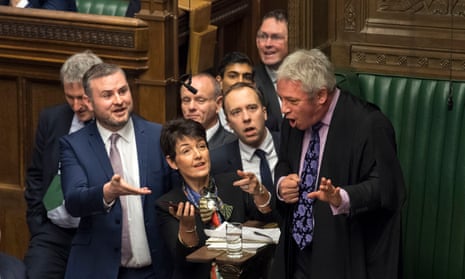Say it like a catechism, every morning, every evening and twice before meals: no one knows what will happen, no one knows what will happen, no one knows what will happen. This is as unpredictable an election as there’s ever been, with voter volatility at record highs and party allegiance at record lows. No one knows how the divisions within the competing tribes of leave and remain will play out: will Nigel Farage hive off pro-Brexit voters from the Tories and so boost Labour, or could it be the other way around? As the late screenwriter William Goldman so famously said of Hollywood: “Nobody knows anything.”
But if we won’t know who’s won till 12 December – and maybe not even then – we already know what’s been lost. The current parliament is about to breathe its last; its final act will be the election of a new Speaker on Monday. As they leave, transformed from MPs back into mere candidates, the members of the old House will have ringing in their ears the booming voice of the attorney general, Geoffrey Cox, who in a pantomime performance in September told them they were “a disgrace”, that they had lost the “moral right to sit on these green benches”. Echoing, too, will be the words of both this prime minister and the last one, denouncing them as saboteurs of the popular will, even as agents of “surrender” to a foreign enemy.
Yet in truth, far from waving off the outgoing Commons with jeers and condemnation, we should thank them for their service. The very fact that Boris Johnson itched to see them gone is testament to their achievement. They had done their job – of acting as a restraint on the executive – with unusual ingenuity and even, whisper it, bravery.
Remember, this was a government that, had it had its own way, would have suspended parliament altogether, using the ancient royal power of prorogation. (It’s thanks to campaigners, lawyers and the wise 11 judges of the supreme court that it was stopped.) Johnson was urging the nation to jump off the 31 October cliff into a no-deal Brexit.
What held him back? Only the imagination and industry of a handful of MPs – Oliver Letwin, Yvette Cooper, Dominic Grieve, Hilary Benn and others – who were determined to find a way to block no deal, one that a majority of MPs could agree on. They succeeded. And then they succeeded again less than a fortnight ago, ensuring that Johnson was not allowed to steamroller his new EU deal into law in just three days. It’s thanks to them that, this weekend, we are still in the European Union.
Letwin, Grieve and the rest of the 21 Tories who were later purged from their party risked their careers to do that, putting the national interest first. It required working with others across the party divide. It required standing up to their leader, their whips, their local activists and a fiercely hostile pro-Brexit press. When it would have been so much easier to keep their heads down, they showed courage.
It also helped having a Speaker in John Bercow who, hardly shy of public attention, knew his duty was to defend parliament against the power-grabbing instincts of the executive.
Now many of them will be gone. The next Commons will assemble without a good number of those Tory rebels, the ex-Speaker and many others. Such churn is normal at any election, but there’s something different this time. Most of those departing MPs are leaving in their mid-60s, after more than two decades of service. But among female Conservatives who are quitting, the average age is 51, having completed just 10 years in the House.

Of course, there will be individual circumstances to explain each case. Some will be leaving because they no longer feel in tune with a party committed to a hard Brexit. Remainers Amber Rudd, Justine Greening and Heidi Allen are among those elected as Tories but who’ve now had enough. This marks yet another symbolic end to the David Cameron modernisation project: these were just the kind of people he wanted as the face of a renewed Conservative party.
But their departure points to an uglier phenomenon – the unending vicious and threatening abuse that is inflicted on women in public life. It’s now routine for a female MP to begin a phone conversation by apologising for the delay in calling back: she was just talking to the police about her security. It might be a stranger sitting in a car outside your home for hours on end, with no explanation. It might be the thousands of abusive tweets or emails, the threats to rape or kill you or harm your children. Anna Soubry this week described the note sent to her 85-year-old mother, threatening her safety, and the condolence card that was sent to her partner saying, “Now that your partner is dead, we’re coming after you.”
Sometimes the misogyny is combined with racism, as it is for Diane Abbott, who alone received half of all the abusive tweets sent to female MPs ahead of the 2017 election, or for the Jewish MPs Luciana Berger and Louise Ellman.
The effect, and perhaps the purpose, is to drive women not just out of politics but the public sphere. In September, Yvette Cooper’s daughter Ellie spoke of the fear she feels when she sees tweets calling her mother a liar and a traitor: “I am scared when our house gets fitted with panic buttons, industrial-locking doors and explosive bags to catch the mail.” Cooper will soon publish She Speaks, an anthology of women’s speeches, from Boudicca to Greta Thunberg, and says she’s been struck by how long women have endured attempts to silence them. “Women have faced this for centuries – and they have persisted,” she says.
Some, though, can’t face it any more. Perhaps withstanding the abuse was worth it when it was for a cause, or a party, they believed in. But when they feel adrift anyway, getting out seems the sensible move. Many worry that the result will be not only women leaving the Commons, but fewer trying to get in, repelled by what they see.
At every election over the last two decades, the proportion of women MPs has increased: it was just shy of one in three in the last parliament. There is a risk now that that progress could stall. The House of Commons that is closing down for election season was stubborn, independent and more female than ever before. Nobody knows anything – but we might just miss it.

